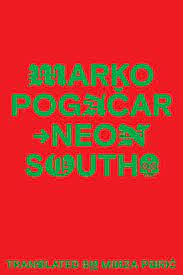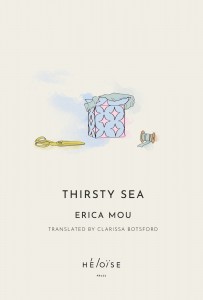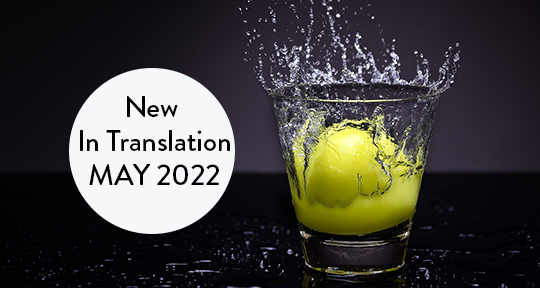In this month of new releases from literatures around the world, we present a poignant and transcendental collection of poems from Palestinian writer Maya Abun Al-Hayyat, a mesmerizing journey through Latin American from Croatian author Marko Pogačar, and a stunning psychological novel of detachment from Erica Mou, in her Anglophone debut. Read on to find out more!

You Can Be the Last Leaf: Selected Poems by Maya Abu Al-Hayyat, translated from the Arabic by Fady Joudah, Milkweed Editions, 2022
Review by Laurel Taylor, Assistant Managing Editor
To raise one’s pen is a political act. As I write these words, it’s been less than forty-eight hours since journalist Shireen Abu Akleh was fatally shot in Jenin. Having acted politically, having written politically, her death is now being used for political means. Words within and about war function as powerful political weapons, bandages, sirens, and songs, all in one. This is what Maya Abu Al-Hayyat shares with us through her incisive verse, as translated from the Arabic by Fady Joudah.
Lovers Swap Language
the way enemies exchanges stabs:
he takes a word from her lexicon
and she takes one from his book.
That’s how poems are made
and also bigoted speechesAnd when lovers and enemies sleep,
the ether carries a hot hum
the universe digests
unaffected.
Words weaponize, the world marches on, but Abu Al-Hayyat rests between breaths, demonstrating through a brilliant puzzle of verbal turns the ways in which trauma has distorted our time. This collection, You Can Be the Last Leaf, brings together verses from multiple times and tomes, holding them in conversation, exchanging the writer’s lexicons and books through the years, and digesting the whole in the face of an indifferent universe.
In his brilliant introduction, Joudah describes Abu Al-Hayyat’s place both as an individual soul but also as someone writing to the collective trauma of the Palestinian people. “The multifarious Palestinian voice lives on in Maya Abu Al-Hayyat’s words, ordinary as grief and daily as laughter.” In the vein of the kitchen table, many of her poems do indeed touch on the quotidian, the life of motherhood and of aging, of love and family. “Mothers Arrange Their Aches at Night,” for example, opens “Joint pain, high sugar, / rheumatic ailments, / a boy who missed school because of a cold”. Quickly, however, the shade of the larger region—of that political conflict—ghosts over the next lines. “mothers feel sadness for mysterious reasons, / like sadness over other mothers / who stand in public streets / holding photos of their sons’ / well-groomed faces / with sideburns and mustaches, / waiting for the camera to capture them / and their chapped hands.” Like Abu Akleh’s reporting, Abu Al-Hayyat’s verse is a camera, and what it captures, what it turns toward, is not only the violence but also the aftermath, the void left by time cut short.
In “Mahmoud,” for example, Abu Al-Hayyat imagines a different future for herself and her lover, who was killed by a bullet from Israeli forces on the first day of the second intifada, as Joudah tells us in his introduction. The poem opens in the hypothetical. “Mahmoud could have been our son. / I’d have objected to the name / and, for family reasons, you’d have insisted on it.” Midway through the poem though, other temporal modes wriggle in. “You’d have forgiven him, / you’re kind like that. He’d only smoked in secret. / But the first rock he’d have thrown / at soldiers at the checkpoint, / to raise his heroic stock in Mana’s eyes, / would have declared war in our house / biting followed by flying slippers.” Mahmoud is forgiven in another timeline, but the lover is kind even now. Mahmoud smoked, but he only hypothetically threw the rock. The poem ends with a slap, the same slap which never landed on Mahmoud’s cheek.
A misguided kid who saps the heart and soul,
that’s who he was. Still you
were martyred eight years
before he was born, and he was martyred
eight years after you were gone.
The balance between here and now, between then and if, tosses the reader about, bringing to her the sharp pain of grief reverberating even years after the initial wound. Moreover, Joudah’s razor-sharp translation gathers those diverging futures, as in “We Could Die in a Traffic Accident,” another poem that plays in the hypothetical timeline. Joudah translates: “We might stop breathing: there are too many of us on the planet. / Or in a famine our spouses will eat us. / And in excess our arteries will clog up. / Smoking kills. / Lack of pleasure. / Too much sex.” The delicate dance between the helping verb and the verbal omission glimmers in Joudah’s rendition, allowing the image to come to the fore, rather than the weighty action of the grammatical construct.
You Can Be the Last Leaf is not, however, only a book of mourning. The poem “I Suffer a Phobia Called Hope” says just as much. Even in a place and time as burdened with trauma as the Palestine of here and now, there is always room for hope’s wounding song. In “Whistling,” Abu Al-Hayyat writes:
Do you see this hole in my neck?
Not sure if it was a bullet or a word that did it.
But I’m certain two lips passed over it
and left a whistling behind.
And also a rustle
whenever I turn
to the future or the past.
The sharp impact of a word echoes the trajectory of bullets aimed, but these holes, too, can be soothed, can make their own reedy music. The political acts wound, maim, and kill. The political acts build, mend, and resist. Abu Al-Hayyat, like many of her fellow Palestinians, raises her pen again.

Neon South by Marko Pogačar, translated from the Croatian by Mirza Purić, Sandorf Passage, 2022
Review by Samantha Siefert, Marketing Manager
Marko Pogačar’s Neon South would most ostensibly be classified as a travel memoir, but I hesitate to call it one—the work reads more like poetry that has gotten lost in fiction. This is, however, a story rooted in journeying. In the prose, Pogačar weaves through different corners of Latin America, from the jungles of Venezuela, to park benches in Cuba, into the darkness of the Mexican night, illuminated in neon. Readers familiar with the regions will recognize old friends in the physical landmarks and cultural icons that populate Pogačar’s thoughts and memories, while those who are simply curious will find plenty of new things about which to wonder.
The book is composed of three parts: The Nude Bolívar, A Carnation from a Poet’s Grave, and Curvas Peligrosas, which are then subdivided into short vignettes, each describing a limited encounter with a particular person or place. These encounters begin by looking outward, mostly at different friends, acquaintances, and strangers, before shifting inward, towards the experience of being on the road and the interior spaces of thinking.
About a third of the way into the book, Pogačar reveals that a friend calls him “el poeta.” This will surprise no one, because readers will have found their way to the same conclusion long before they arrive at that passage. Pogačar began his career as a poet, publishing five collections prior to Neon South. The first, Vortex over Santa Cruz, received the Narvh Jezika Award (2005) for the best poetry manuscript of a writer under thirty-five, as well as the Kvirin Award (2006) for best poetry collection. His poetry is known for its combinations of fragmentary images, and for dealing with philosophy, politics, pop culture, everyday observations, and reflections on language. Neon South fits easily into this oeuvre—a natural extension of that work.
In these stories, plot takes a backseat, privileging the art of describing sights, sounds, and memories as they occur, rooting them in observation, evoking the traveler’s meandering restlessness. It is in this stillness that Neon South offers its poignancy in looking at the long reach of history extending into the present, of cultures stretching around the globe. In Venezuela we meet Janis—as in Janis Joplin—whose father loves the blues and works at an electric cable factory, and whose family lives in one of the world’s largest slums in Caracas. Pogačar describes her reality:
All that remains of the oil-fueled prosperity of the 1950s and ’60s is the memories of those old enough to remember, distant, wizened dotards terrified by the emptiness of the pharmacy shelves. The golden era of Chavismo, when I met both Janis and the city, is also a thing of the past.
In Cuba we meet Kike, a second-generation Caribbean of Calabrian descent on his mother’s side, whose father trained in the USSR and North Vietnam before dying in Luanda. Kike leads us to a nightclub, recalling the show he was attending when the death of Fidel Castro was announced:
He was at a punk rock show, drunk on the night and the West, when two policemen interrupted the band that was playing like there’s no tomorrow. First they just flailed their arms as if they’d gone insane or got caught by the mad mosh-pit machine, then one of them managed to get his hands on the microphone and shout over the deafening drums: ¡El comandante está muerto!
In this way, our journey through Latin America is unmoored in time within the experiences of life lived. Memory is layered, reaching back into ancestry and compounding as the perspectives of those we meet influence our own.
Becoming the intimate guest of Pogačar’s memories offers the unique opportunity to meet Latin America not only through his travels and expertise, but also his personal recollections of Yugoslavia’s dissolution. Hugo Chavez’s revolution reminds him of the Yugoslav one; Havana’s benches recall the “good old wooden socialist” benches he might find at home; and tequila and mezcal, after all, “don’t substantially differ from rakia”. Such cultural strata surface with particular eloquence in Mexico, when—as sometimes happens on the road—the sound of a familiar tongue “sprayed around the narrow room in a polyphony” ignites a friendship among countrymen in a bar:
Seven people at the adjacent table from all over Yugoslavia, from Niš to Metković to Drniš, came to celebrate a friend’s marriage and visit the Aztec empire. After all, are our customs, our kingdoms, our churches and wars, our arsons and human sacrifices one iota different from the Aztec ones, whose cruelty, inscribed in stone, we seek in order to feel the silent shivers of fear and be at the same time anointed by a sweet mise en abyme of progress?
Like spots in a pointillist painting, the people and places of narrative form points of reference that multiply and layer to depict a much larger, interconnected world. The vastness of history becomes intimate and personal.
As a work in translation, Neon South offers a new space, another layer, in which to explore this theme. Translator Mirza Purić, a former editor-at-large for Asymptote, fits as a comfortable travel companion for Pogačar, allowing the book’s language its richness and intrigue while remaining transparent enough that one can easily note how far the stories have traveled. The occasional phrase remaining in Spanish, in combination with cultural sprinklings from Yugoslavia and beyond, enhances this effect. The culmination is a contemplative, multifaceted, cultural conversation in poetry, inviting openly any reader to layer their own thoughts, memories, and travels into the fold.

Thirsty Sea by Erica Mou, translated from the Italian by Clarissa Botsford, Héloïse Press, 2022
Review by Sabrina Parker Greene, Assistant Editor
There’s a new kid in the world of literary translation: Héloïse Press has joined the scene this season with three new books brought into English. Founded by Aina Marti and located in Canterbury, UK, the press “brings together women’s issues and literary sophistication” with a small selection of women writers from around the world whose narratives are “intimate, visceral and powerful.” And Erica Mou’s debut, Thirsty Sea, translated from Italian by Clarissa Botsford, certainly fits the bill; this novel follows narrator Maria through her thoughts, feelings, memories, and goings-on for a mere twenty-four hours, but in effect, the detailed nature of the prose gives a much-elongated sense of time.
Maria is haunted—by her boyfriend, Nicola, sleeping next to her and “secretly” looking through her calendar on her phone; by her mother, who snaps pictures of her face with each and every gaze; by Ruth, an ex-friend whose business idea Maria has stolen and is currently operating; and, perhaps most importantly, by her sister, who died unexpectedly while the two young girls were simply playing together. These characters weave in and out of Maria’s day, in her life and in her mind.
Maria’s occupation, too, allows her to lurk in others’ relationships. Thanks to Ruth’s ingenuity, Maria operates a shop with nothing to buy—except her ideas (her own, not Ruth’s). She offers to her clientele a gift service: plans and executions for when you don’t know what to get your wife for your anniversary, or your boss (whom you secretly love) for his retirement. Thus, Maria worms her way into others’ lives, executing her own sort of haunting, invisible in the relationships themselves but certainly existent in the exchanges between them—at once strange and intimate. She has but one steady client—a man whose wife is suffering from memory loss, who thinks it’s her birthday too often and shouldn’t be disappointed. Maria is haunted, too, by this woman she’s never met—constantly thinking of pre-emptive gift ideas, gradually getting to know her better than the woman knows herself.
The novel is divided into four parts, based on mealtimes: Dinner, Breakfast, Lunch, and Teatime. I like this order of events—starting off with the heaviest bit, resting, re-energizing, then trailing off with the day. Interspersed throughout the text are little poetic refrains, which Botsford does well to contextualize in her note at the beginning of the text. We are told that Maria likes compound words, and these poems serve as little ruminations on the meanings and double meanings of themes within the text. Yet, I am left with the impression that it’s really Mou who is intrigued by such reflections on language rather than Maria—it’s an unusual and daring feature that does nothing to detract from the narrative progression, and the exercise in translating them is a testament to Botsford’s diligence and capabilities.
Otherwise, the writing itself is a feat—I highlighted more perfect phrases and fantastic images that I can list in this review. Maria critiques Nicola’s habit of “force-feed[ing] silence with words” and thinks her mother’s choice of Marseille as a vacation spot is “perfect for her: soap and rats”. There is a refrain of Maria going to brush her teeth, “one of the things [she likes] most in the universe” for its power to reset her as “fresh, immaculate, immune”. These small perceptions are what fully fleshes out a person, a character; nothing could be more real. And what would a person be without their anxieties:
I’ve skipped all my primary needs this shitty night. Like when you don’t eat for a long time and you’re no longer hungry. Or when you don’t make love for a long time and you’re no longer in love.
Like a sneeze that doesn’t come.
As Nicola’s back rises and falls in a steady rhythm, I lie next to him and try to sync up with him.
But he’s breathing too fast and at his speed I can’t breathe at all.
This precision all speaks to Mou’s keen skills in observation—and what’s more, her unapologetic way of relaying apparent truths without explaining them, which is the true power of this text. Reading it is like talking to your best friend—the one who doesn’t need any context for the quotidian thoughts and happenings you share with them. Mou trusts that there is a foundational, mutual understanding, and by writing as if there were already one in place, she inevitably earns it—a crucial foil to this is that the characters themselves do not have this kind of foundation. What’s fascinating is that the book reads like autofiction but is truly a novel in shape and scope; its declarative nature makes it some of the most candid and noble writing in recent memory.
The title, Thirsty Sea, alludes to an underlying theme of the novel, and Maria’s life: what does it mean when you have everything and still want more? Or if you want less of the things you’re supposed to want? What we can take from others, what we can give to ourselves—what we do to keep ourselves whole—is reflected with brightness and care in the pages of this novel: a total triumph of cognizance, a haunting presence in its own right.
*****
Read more on the Asymptote blog:

